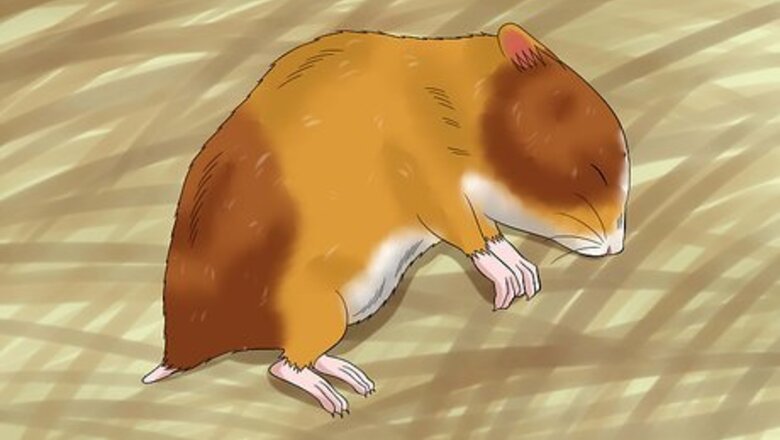
views
Deciding When to Euthanize Your Hamster
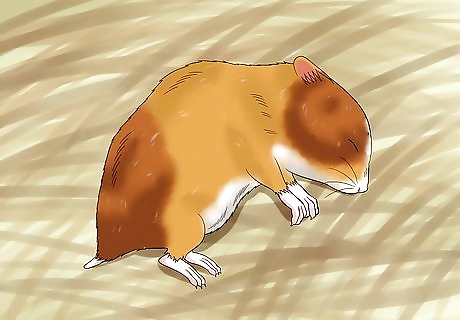
Observe your hamster's behavior. Emotions can make it very difficult to decide whether to euthanize a pet, even when the pet is very sick. To make the decision process a little easier, look objectively at your hamster's behavior. For example, watch how he walks—if his back is arched or he is unsteady on his feet, he could be feeling extremely sick. Hamsters love to run and play. If your hamster stays hunched over in a corner of his cage, he is very uncomfortable and likely very sick. Make a list of several activities your hamster loves to do (e.g., run in his hamster wheel, gnaw on chew toys, etc.). If he no longer does those things, his quality of life has worsened, making euthanasia a reasonable option. Track his good days and bad days in a journal. When he starts having more bad days and good days, it is time to start considering euthanasia.
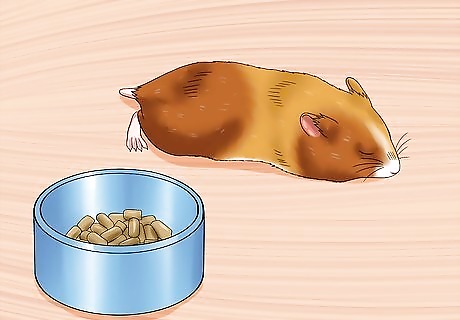
Monitor how much your hamster eats and drinks. When your hamster becomes so sick that he is no longer eating or drinking, he is letting you know that he is feeling pretty miserable. Not eating or drinking for as little as 24 hours can be very serious in hamsters. Talk to your veterinarian about euthanizing your hamster if it has been at least one day since your hamster ate or drank anything.
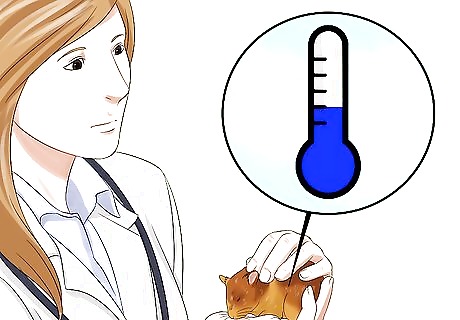
Take your hamster to your veterinarian. Your veterinarian cannot make the decision to euthanize for you, but he or she can guide you through the decision process. One way your veterinarian can do this is to accurately diagnose your hamster. When you know the details of your hamster's sickness, and his prognosis, you can make a clearer decision on whether to euthanize him. Geriatric diseases in hamsters (e.g. liver failure, kidney failure, cancer) are those that occur after 18 months of age. They have no cure and can worsen a hamster's quality of life. Euthanasia is a reasonable option for hamsters with geriatric diseases. If your hamster has a geriatric disease, keep him as comfortable as possible until life has become too unbearable to him. This includes keeping him in a quiet area and handling him as little as possible. Discuss treatment options, if any, with your veterinarian. Be aware that your hamster could be so sick that he would not be able to tolerate intense veterinary care. Do not let your hamster suffer through treatment if it will not bring him better quality of life.
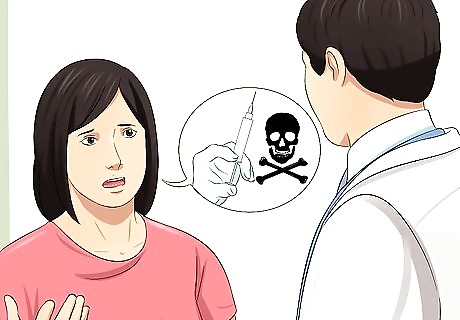
Talk to your veterinarian. You will probably have a lot of questions and concerns about euthanasia. During your appointment, discuss your hamster's sickness and the possibility of euthanasia. Ask your veterinarian questions about the euthanasia process, as well as options for cremating or burying your hamster. Consider asking your veterinarian if he or she thinks euthanasia is right for your hamster. No matter how your veterinarian answers, remember that only you can make the decision to euthanize your hamster. Ask your veterinarian if he or she performs at-home euthanasia. Be mindful that not all veterinarians will do this. If you have children, discuss the best way to tell them about euthanasia. Children do not always understand end-of-life issues, so you will have to be careful about explaining how ending a pet's life can be humane. Ask your veterinarian about local pet loss support groups. Ask as many questions as you can think of, and express any concerns you may have. Although euthanasia is a difficult topic, your veterinarian understands this difficulty and can help you talk things through.
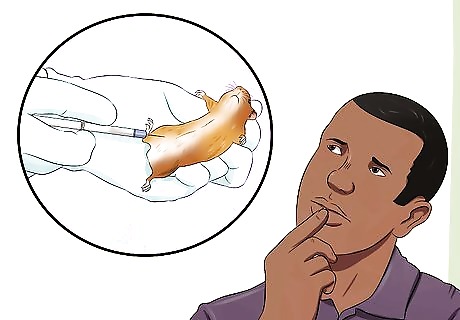
Decide if euthanizing is best for you or for your hamster. As if the euthanasia decision was not difficult enough, you should know whether you are considering your hamster's wellbeing or your own. You may feel unsure, or maybe even a little guilty, but your hamster's wellbeing should come first. If you are delaying the decision, ask yourself if it's because you are not ready to let your hamster go. Be aware that delaying your decision could be prolonging your hamster's suffering.
Euthanizing Your Sick Hamster
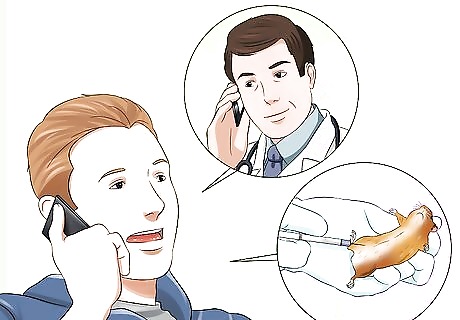
Schedule an appointment with your veterinarian. When you make the appointment, indicate what time of day and what day of the week will work for you. To be sensitive to a pet owner's needs, veterinarians will typically schedule a euthanasia at the end of the day, when there are no other appointments. The day of the week will also be important. You may want to schedule the euthanasia for the end of the week, when you will have the weekend to process what happened and start the grieving process. If you know the euthanasia will be hard for you, bring someone with you to the appointment. Check with them before making the appointment to make sure they will be available.

Decide to bury or cremate your hamster. Check with your local health department about home burials for pets. Local laws may not allow pet owners to bury their pets in their yards. If you live in an apartment, or in the heart of a city, it is unlikely that you will be able to bury your hamster. Your veterinarian can recommend professional pet burial or crematory services. Contact them before your appointment so those arrangements can already be in place. Your veterinarian may also work with a pet burial or cremation service.

Spend extra time with your hamster. Your hamster may be very sick, but he will probably appreciate you spending time with him in his final days. Although you may feel sad, or maybe even guilty about having him euthanized, do your best to remain calm around him. He could pick up on whatever you are feeling, so stay as positive as possible.

Allow your veterinarian to euthanize your hamster. No matter how much you have prepared yourself for putting your hamster to sleep, the actual act of having your hamster euthanized may be difficult for you. Your veterinarian will make sure the euthanasia will be quick, painless, and peaceful for your hamster. Your veterinarian will most likely administer a lethal injection into your hamster's belly and your hamster will pass away as a result. Your veterinarian will check your hamster for a pulse to ensure that he has passed away. It is your decision whether you want to be in the room for the euthanasia. Some pet owners cannot stand the thought of seeing their pet euthanized, and others want to be close to their beloved pet until the very end. It is also your choice in how to say goodbye to your hamster. You may want to say a few things to him before and after he has passed on. It is up to you.
Coping With the Loss of Your Hamster

Give yourself time to grieve. Although small in size, your hamster probably meant a lot to you. Acknowledge your grief and give yourself time to process the loss. There's no timetable for grieving—it may take you a few days, maybe longer. Consider writing your feelings down if you're having trouble processing your thoughts.
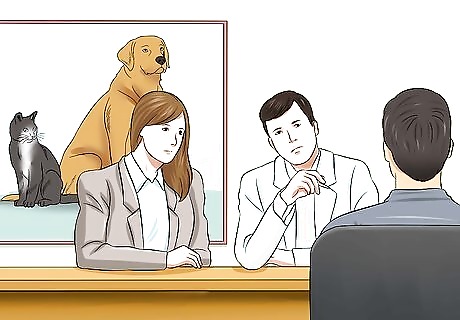
Contact local pet loss support groups. Pet loss support groups help pet owners manage the grief of losing a pet. Many veterinary schools have pet loss hotlines that you can contact. Your veterinarian, or even other pet owners, can recommend some local pet loss support groups that you can contact. The staff at your local humane society may also be able to recommend pet loss support groups.
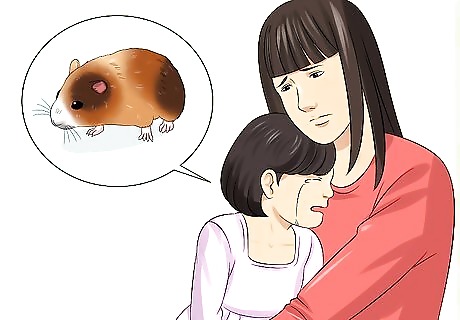
Encourage your children to express their feelings. Children can have a hard time dealing with the death of a pet. If you have children, encourage them to talk about how they feel about your hamster's death. Do not buy another pet for your children to make them feel better. Give them time to express how they feel about your hamster's death before bringing a new pet into the home.
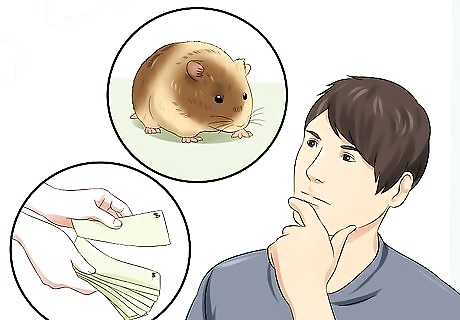
Decide when to get another pet. You may be the type of person who does not grieve for long over the loss of a pet. Or, you might need a long time before you are ready to even think about getting another hamster (or another type of pet). Do not feel the need to rush into buying another pet. Remember that a new pet is not a replacement for your hamster. You will know when the time is right for you to get another pet.














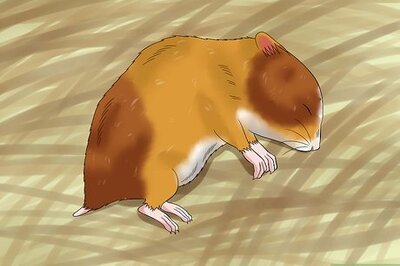




Comments
0 comment